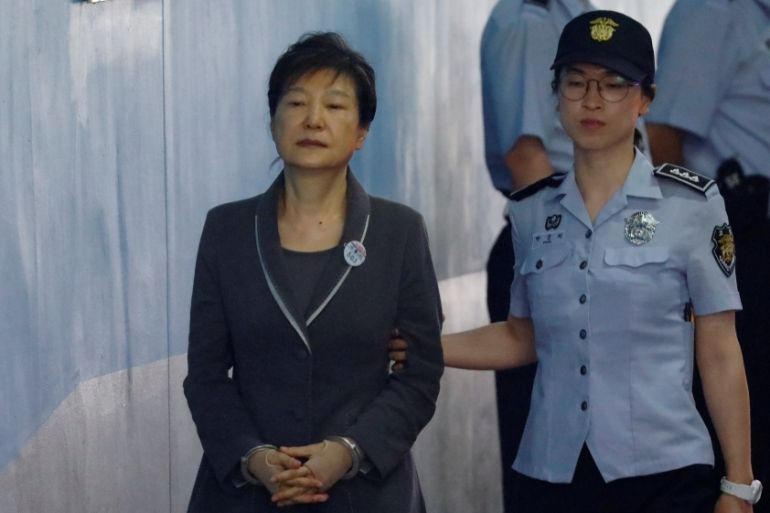Appeals court gives ex-Korean President Park 25-year sentence
Court also fines Park, who was removed from office in 2017 over corruption allegations, almost $17.8m.

A South Korean appeals court has increased the prison sentence for former President Park Geun-hye to 25 years in a case stemming from a far-reaching corruption scandal that ended her rule in 2017.
Park became South Korea’s first democratically elected leader to be forced from office when the Constitutional Court removed her over a scandal that landed the heads of two conglomerates in jail.
Keep reading
list of 4 itemsSlapped: Speaking Up In Thailand
Vietnam tycoon Truong My Lan sentenced to death in $12.5bn fraud case
Mexico cuts ties with Ecuador after police raid embassy
The 66-year-old was sentenced to 24 years in prison and an 18 billion won ($16m) fine by a lower court in April in a ruling that the prosecution appealed.
On Friday, the Seoul High Court found that Park colluded with her friend, Choi Soon-sil, to receive tens of billions of won from major conglomerates to help Choi’s family and fund non-profit foundations owned by her, according to the court documents.
|
|
The court also increased her fine by 2 billion won ($1.78m) to 20 billion won ($17.8m).
“Such unethical dealings between political power and financial power harms the essence of democracy and distorts order in the market economy, giving the people a grave sense of loss and deep distrust of our society,” presiding judge Kim Mun-suk said in the ruling.
“A strict penalty is unavoidable.”
In July, another South Korean court sentenced Park to eight years in prison in a separate case arising from the same scandal, finding her guilty on charges of causing the loss of government funds and interfering in a 2016 parliamentary election.
Park has been defended by state attorneys after her former defence team quit en masse last year in protest against a Seoul court’s handling of her case, including the extension of her detention.
Park has been in jail since March 31, 2017, but has denied wrongdoing and was not present in court.
She returned to South Korea’s presidential palace in 2012 as the country’s first woman leader more than three decades after she left it following the assassination of her father.
Her removal last year led to a presidential election won by the liberal Moon Jae-in, whose conciliatory stance on North Korea has led to a significant warming of ties with the North.